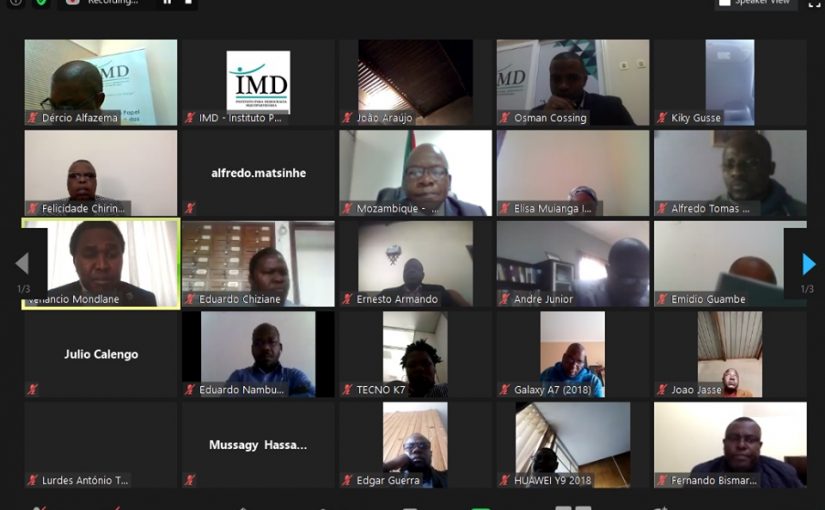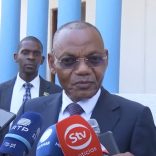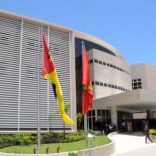EU supports two CSOs that assist technical committee in Mozambique's inclusive political dialogue
There is room in the Constitution of the Republic to declare a new state of emergency – Rádio Moçambique

Photo: Sala da Paz
According to the President of the Parliamentary Commission for Constitutional Affairs, Human Rights and Legality, António Boene, the Constitution of the Republic of Mozambique opens space for the President of the Republic to declare a new State of Emergency.
For Boene, despite the fact that the Constitution of the Republic does not indicate exactly what should be done if the reasons that led to the declaration of the State of Emergency up to the nominal limit persist or worsen, a new State of Emergency can be enacted.
“Regarding the possibility of decreeing or not a new State of Emergency, or opting for the State of Siege, I maintain the same position that yes, the Constitution opens space for the decree of a new State of Emergency or else the State of Siege. And a dispassionate interpretation of the Constitution must be made. We have to look at the moment of application of the Constitutional norms, what is the meaning and the scope that we have in view with these norms,” Boene said.
According to Boene, regarding the number of limitations that the Constitution establishes for the extension of the State of Emergency, the President of the Republic having reached them, and the reasons that dictated the declaration of the State of Emergency persisting, what seems more correct is to decree a State of Siege, always obeying the Constitutional limits.
“At first, what determined the declaration of the State of Emergency is that there were eight positive cases. Today there are 1,700, with a tendency to rise. It is evident that the reasons that determined the State of Emergency have changed greatly. And the Constitution does not tell us, in the event these reasons that determined the declaration of the State of Emergency get worse, what can be done afterwards. And we have to find solutions for these cases. It means that the reasons that determined the declaration of the State of Emergency did not persist; on the contrary, these reasons got worse. It means that, in my opinion, it is justified if there is a need for a new State of Emergency to be enacted,” Boene continues.
For the President of the First Commission of the Assembly of the Republic, everything depends on the circumstances and the information available when deciding on a new State of Emergency or State of Siege, or other prerogatives may be chosen, such as the disaster management law, where exceptional administrative measures may be enacted.
In turn, the Deputy of the Assembly of the Republic, Venâncio Mondlane, believes that the Constitution of the Republic does not permit the declaration of the State of Siege, because the Constitution deals with the terms (emergency and siege) of the same form.
“However, it should be noted that the lack of clarification of these concepts may generate multiple constraints: first, the confusion in society, on the other hand, government irresponsibility, inasmuch as with the frequent [state of emergency] declarations , there are families who suffer due to the situation in which they live. Hence the need to clearly define what the declaration consists of with each concept.”
According to Venâncio, the debate on State of Siege, Emergency and/or Disaster Management is too primary given that, after 120 days of restrictions, attention should be focused on the need for urgent and stronger measures for economic recovery.
Contrary to the thinking of the other interlocutors, Mozambican academic, Eduardo Namburete is sceptical about the declaration of the new State of Emergency or State of Siege, referring the Head of State to the administrative alternatives of state of calamity. “If we go back to the State of Emergency or the State of Siege, we will be distorting the Constitution, because it would make no sense for the legislator to have placed limits on this type of situation,” the academic said.
In turn, Osman Cossing, Program Manager at IMD, warned that divergences in terms of interpretation of constitutional norms between knowledgeable people justify the urgent need to prepare citizens for the post-State of Emergency so that they are informed of the new reality.
“It is important that there is more sensitisation and awareness raising of the citizens and involve more actors in the process, as are the cases of community and religious leaders and to reinforce the levels of inspection for the sectors that are subject to monitoring,” Cossing said.
Regarding the evaluation of the implementation of the measures in the State of emergency, Cossing stressed that the IMD has been monitoring the implementation of the State of Emergency, and its perception was that some of the State of Emergency measures were highly effective, and may have contributed to delaying the peak of Covid-19.
These positions were presented yesterday at a debate promoted by the IMD on the ” Legal Perspectives on the Post- State of Emergency due to Covid-19″.
A Constituição da República abre espaço para decretar novo Estado de Emergência
De acordo com o Presidente da Comissão dos Assuntos Constitucionais, Direitos Humanos e de Legalidade, António Boene, a Constituição da República de Moçambique abre espaço para o Presidente da República decretar novo Estado de Emergência.
Para Boene, não obstante a Constituição da República não indicar taxativamente o que se deve fazer em caso de agravamento das razões que levaram a declaração até ao limite do Estado de Emergência pode-se decretar um novo Estado de Emergência.
“Quanto a possibilidade de decretar-se ou não um novo Estado de Emergência ou optar-se pelo Estado do Sítio, eu mantenho a mesma posição de que sim a constituição abre espaço para decretar-se um novo Estado de Emergência ou então o Estado de Sítio. E é preciso fazer-se uma interpretação desapaixonada da constituição. Temos que olhar para o momento de aplicação das normas constitucionais, qual é o sentido e o alcance que se tem em vista com estas normas”.
Segundo Boene, no que concerne ao número de limitações que a constituição estabelece para a prorrogação do Estado de Emergência, tendo o Presidente da República atingido e persistindo as razões que ditaram a declaração do Estado de Emergência, para o orador, o que mais parece correcto, é decretar o Estado de Sítio obedecendo, contudo, os limites constitucionais.
“De início, o que determinou a declaração do Estado de Emergência é que existiam oito casos positivos. Hoje são 1700 e com tendência a subir. É evidente que as razões que determinaram o Estado de Emergência alteraram-se grandemente. E a constituição não nos diz, na eventualidade destas razões que determinaram a declaração do Estado de Emergência agravarem-se o que é que pode ser feito a posterior. E nós temos que arranjar soluções para estes casos. Significa que não persistiram as razões que determinaram a declaração do Estado de Emergência, pelo contrário estas razões agravaram-se. Significa que, no meu entender, justifica-se caso haja necessidade que se decrete um novo Estado de Emergência”.
Para o Presidente da Primeira Comissão da Assembleia da República, tudo depende das circunstâncias e da informação disponível para se decidir sobre um novo Estado de Emergência ou Estado de Sítio ou ainda poderá se optar por outras prerrogativas como a lei de gestão de calamidades, onde se pode aplicar medidas administrativas de carácter excepcional.
Por sua vez, o Deputado da Assembleia da República, Venâncio Mondlane, para a situação do Estado de emergência, a Constituição da República não abre espaço para a declaração do Estado do Sítio, porque a Constituição trata os termos (emergência e sítio) da mesma forma.
“Porém ressalva-se que a falta de clarificação destes conceitos poderá gerar constrangimentos múltiplos: primeiro, a confusão na sociedade, por outro lado a irresponsabilidade governativa na medida em que com as frequentes declarações há famílias que sofrem devido a situação em que se vive daí a necessidade de se definir claramente em que consiste a declaração com cada conceito”.
Segundo Venâncio, o debate sobre Estado de Sítio, Emergência e/ou de Gestão de Calamidades é demasiado primário uma vez que passados 120 dias de restrições as atenções deviam estar voltadas para a necessidade de medidas urgentes e mais fortes para recuperação económica.
Contrariamente ao pensamento dos outros interlocutores, o académico moçambicano, Eduardo Namburete é céptico quanto a declaração do novo Estado de Emergência ou Estado de Sítio, remetendo ao Chefe de Estado a alternativas administrativas de estado de calamidade. “Se voltarmos ao Estado de Emergência ou estado de Sítio estaremos a desvirtuar a Constituição porque não faria sentido nenhum o legislador ter colocado limites para este tipo de situações”, disse o académico.
Por sua vez, Osman Cossing, Gestor de Programas no IMD, alertou para o facto das divergências em termos de interpretação das normas constitucionais entre pessoas entendidas na matéria justifica a necessidade urgente de se preparar o cidadão para o pós- Estado de Emergência para que esteja informado para a nova realidade.
“E importante que haja mais sensibilização e consciencialização do cidadão e envolver mais actores no processo, como são os casos de lideranças comunitárias, religiosas e se reforçar os níveis de fiscalização para os sectores que são passíveis de fiscalização”, disse Cossing.
No que tange a avaliação da implementação das medidas no Estado de emergência, Cossing sublinhou que o IMD tem estado a fazer alguma monitoria da implementação de Estado de Emergência e sua percepção que, no que diz respeito às medidas de Estado de Emergência, tiveram, parte delas grande eficácia, que de alguma forma poderão ter contribuído para retardar o pico da Covid-19.
Estas posições foram apresentadas durante uma sessão de diálogo virtual, promovido pelo Instituto para a Democracia Multipartidária (IMD), que tinha como principal objectivo refletir sobre as “Perspectivas jurídicas Pós- Estado de emergência devido a Covid-19”. (RM)












Leave a Reply
Be the First to Comment!
You must be logged in to post a comment.
You must be logged in to post a comment.